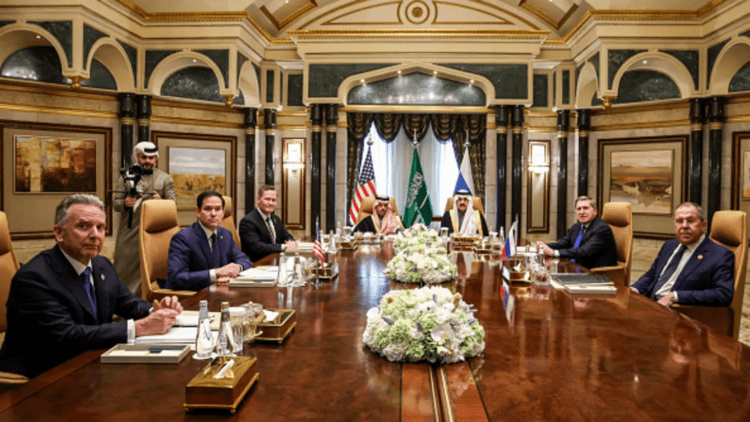Top US and Russian officials sat down in Saudi Arabia on Tuesday for premier-level discussions aimed at reviving strained relations—their first official discussion since the Russian invasion of Ukraine.
Hopes of a breakthrough were deflated, with both sides downplaying the significance of the meeting. Despite this, the mere fact that they were having such conversations has caused consternation in Ukraine and across Europe, particularly with recent US diplomatic efforts towards Moscow.
A Symbolic Yet Tense Meeting
The talks were conducted by Diriyah Palace in Riyadh, starting off without the usual handshakes and opening statements. US Secretary of State Marco Rubio was pitted against Russian Foreign Minister Sergei Lavrov, with US National Security Advisor Mike Waltz and Middle East envoy Steve Witkoff on both sides. Lavrov was joined by senior Russian presidential aide Yuri Ushakov, with Saudi Foreign Minister Prince Faisal bin Farhan and National Security Adviser Musaad bin Mohammad al-Aiban.
Notably, Ukraine was left out of the negotiations. Ukrainian President Volodymyr Zelensky lamented that Kyiv was unaware of the negotiations and could not verify agreements made without its participation. Meanwhile, European leaders held an emergency summit in Paris and organized their response to the US administration’s diplomatic action.

Anadolu | Anadolu | Getty Images
Trump-Putin Summit on the Horizon?
A potential sit-down between US President Donald Trump and Russian President Vladimir Putin is reportedly in the pipeline. Trump is eager to wrap up the present Ukraine situation quickly, whereas Moscow would use this as an opportunity to negotiate strategic concessions.
Any permanent settlement, Kremlin spokesman Dmitry Peskov added, would have to consider broader European security concerns. He restated Ukraine’s right to become a member of the EU but reiterated Russia’s firm opposition to the expansion of NATO. Peskov further added that Putin was open to speaking with Zelensky “if need be.”
Meanwhile, back in Beijing, Chinese Foreign Ministry spokesman Guo Jiakun embraced gestures towards peace, urging inclusive discussions involving all sides.
Shifting Diplomatic Landscape
In preparation for the Riyadh conference, Moscow dropped the hint that it was prepared to look beyond “the abnormal relations” with Washington, excluding European participation in any future negotiations. Russian economic negotiator Kirill Dmitriev stated that negotiations on US-Russia relations could bring fruitful results in the next few months, as both sides considered proposals being discussed.
Russia has for a long time wanted to restrict NATO’s activity in Europe and would rather negotiate bilaterally with the US on security issues outside the conflict in Ukraine. Although the Riyadh meeting is an improvement, it is still not clear if a quick resolution can be expected.

US State Department spokesperson Tammy Bruce cautioned against expecting rapid progress, putting the meeting into the context of a long process. Russian representative Yuri Ushakov also reported that negotiations focused on laying the groundwork for future Ukraine negotiations.
Ukraine’s Position and European Response
Both Russia and Ukraine have ruled out territorial compromises. Even as Zelensky showed openness to talking with Putin recently, he insists on negotiations being preceded by a collective position with allies of Ukraine.
Zelensky, who was in Turkey on Tuesday to see President Recep Tayyip Erdogan, will travel to Saudi Arabia on Wednesday. Russian officials, in the meantime, have excluded European participation in Ukraine-related negotiations, with Lavrov stating that a European-led peace process is “not an option.”
Saudi Arabia’s Growing Diplomatic Role
The fact that the meeting is taking place in Saudi Arabia is evidence of changing geopolitics. Previously diplomatically shut out Riyadh is now a go-between of primary importance for global negotiations.
The change was attributed to National University of Singapore’s James Dorsey by noting how previous US-Russia summits typically are convened in Europe. Under current tensions, however, possibilities like Asia or the Middle East have proved to be better places.
As Washington and Moscow balance the thin tightrope of talks, the world is watching closely to see whether this discussion will mark the beginning of serious diplomatic progress—or merely another episode of global gamesmanship.









